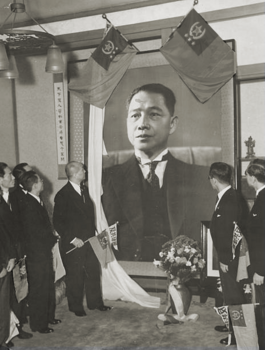Sen Thought
| Part of a series on |
| Sen Thought |
|---|
 |
Sen Thought, Sen Kunuma Thought, or Seninism, is the variety of Tanggu Communism that Sen Kunuma developed for realising a socialist revolution in the agricultural, semi-feudal, pre-industrial society of the People's Republic of Tangkuo. From the 1940s until the heavy Maximist aligned social and economic reforms of Kodai Šentumen in the 1960s, Sen Thought was the political and military ideology of the Communist Party of Tangkuo and of Seninist revolutionary movements across Aeia.
Historically, Sen Kunuma Thought was not a wholly new ideology but instead an elaboration and modernisation of ...'s unfinished philosophy and policies that is influenced by aspects of both the Midrasian Maximists and parts of Tanggu Anarchism. While the People's Four Principles still were accepted, Sen Kunuma Thouught proposed that the primary reason for the failure of the spread of Tanggu communism was the result of a lack of social revolution, and the lack of any action against patriarchical, semi-feudal views and institutions. The reasoning behind this idea is that the First Republic failed to prove that its promises of democratic republicanism would actually bring any needed social changes to the people of Tangkuo, particularly in Zangwu Province. To win, reasoned Sen Kunuma, one needs to gain the trust of the people and also fully disrupt the social and economic basis of the “Old Tangkuo” in all its forms, getting rid of figures such as the landlords, the warlords, and the monarchists in the public eye.
By undermining the exploitative economic system and enacting Maximist reforms that create a collectivised semi-democratic union-controlled economy controlled by and for the Tanggu, Sen Kunuma hoped to spark both a social and political revolution that would advance the semi-feudal culture and politics of Tangkuo on the level of great Asuran nations to become a world power.
Sen Kunuma proposed economic policies that were highly top-down in nature, where the state would spearhead a mixed program of nationalizing key industries, establishing firm land rent taxes, and liquidating criminal and foreign enterprises. Socially, he wished to establish a “National Revolution” under his rule that creates a new modernized and humanist Tanggu culture that gets rid of the old patriarchal Confucian order. These two policy planks combined were intended to work in tandem with military unification to disrupt the material and social basis for the warlords while also creating a foundation for a unified Tangkuo.
